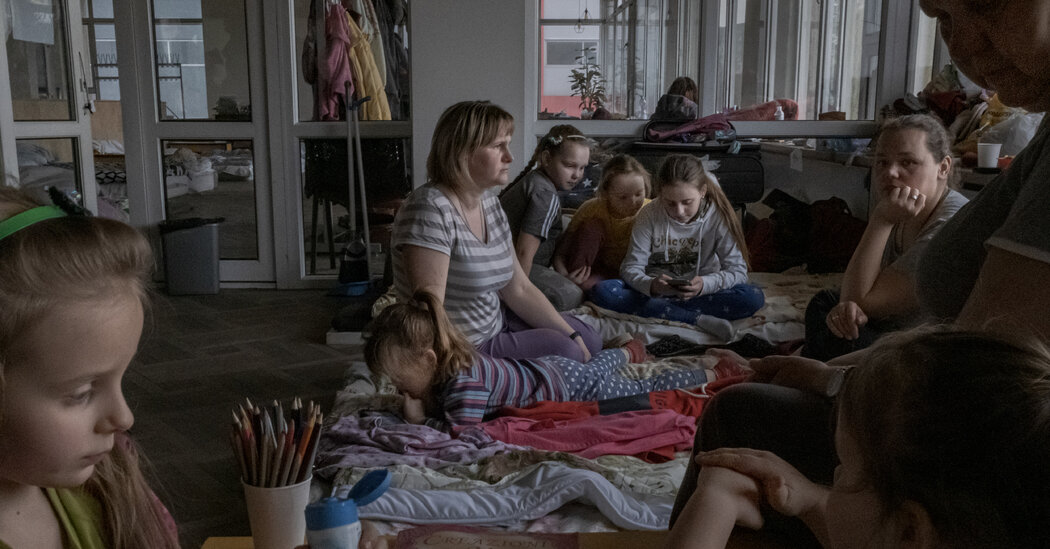
LVIV, Ukraine — After Russian forces surrounded the city of Mariupol in southern Ukraine, cutting off its water and fuel and preventing aid convoys from entering, Yulia Beley sheltered in a neighbor’s basement with her three daughters and struggled to survive.
Her husband was off defending the city, so she ventured out as bombs rained down to fetch water from a distant well and tried to comfort her children while the shelling shook the walls and ceiling. In time, the family’s food dwindled and Ms. Beley, a baker, said she fed her hungry children one bowl of porridge a day to share between them. Her 6-year-old daughter, Ivanka, dreamed of the poppy seed sweet rolls her mother had made before the war.
“It tears you apart,” said Ms. Beley, 33, still traumatized after her escape from the city a week ago. “I just sobbed, just cried, screaming into the pillow when no one could see.”
Shortly after Russia invaded Ukraine, it laid siege to Mariupol, using the ancient warfare tactic to try to starve the once-bustling city of 430,000 people into surrender.
From the days when armies surrounded medieval castles in Europe to the battle of Stalingrad in World War II and the squeeze put on rebel communities in Syria during the 11-year civil war, militaries have used sieges throughout history regardless of the catastrophic effects on civilians caught in the middle.
This month, Secretary of State Anthony J. Blinken accused Russia of “starving” cities in Ukraine. He invoked the memory of the brother of President Vladimir V. Putin of Russia, Viktor, who died in infancy during the German siege of Leningrad during World War II.
“It is shameful,” Mr. Blinken said. “The world is saying to Russia: ‘Stop these attacks immediately. Let the food and medicine in. Let the people out safely, and end this war of choice against Ukraine.’”
Scholars of siege warfare say the tactic serves different purposes: to weaken enemies while avoiding clashes that can kill the besieging force’s own soldiers, or to freeze active fronts while attacking forces reposition. But the grueling nature of sieges — and how they use hunger to turn people’s own bodies against them — gives them a psychological power unique among war tactics, according to scholars and siege survivors.
Depriving a residential area of food while bombarding it serves not only to flush out combatants, she said, but to communicate to everyone trapped inside: “You are not an equal human to me. You don’t deserve to eat, drink, have medicine or even breathe!”
After they surrounded Mariupol last month, Russian forces cut off the city from everything it needed to live, the mayor, Vadym Boychenko, said on Ukrainian national television. They also destroyed the city’s power plants, cutting off electricity for residents as temperatures froze, Mr. Boychenko said, and then the water and gas, essential for cooking and heating.
Some civilians managed to flee, making harrowing journeys through destroyed streets and Russian checkpoints. But about 160,000 people are believed to still be trapped inside the city, Mr. Boychenko said, and more than two dozen buses sent days ago to evacuate them had not been able to enter the city because of Russian shelling.
On Monday, the International Committee of the Red Cross said it was ceasing relief operations in Mariupol because the warring parties could not guarantee the safety of aid workers.
Almost 5,000 people, including about 210 children, have been killed there, the mayor estimated, but the figures could not be confirmed because of the difficulty of getting information.
Russian forces are in control of parts of Mariupol, President Volodymyr Zelensky of Ukraine told a group of independent Russian journalists on Sunday. But the center of the city continues to hold, according to Ukrainian and British military assessments.
An aide to the mayor, Pyotr Andryuschenko, told The New York Times that an estimated 3,000 Ukrainian fighters from the Azov Battalion were defending the city against about 14,000 Moscow-backed soldiers.
When the siege began, one Mariupol resident, Kristina, said she, her husband and two children camped out in the entryway of their building, hoping it would provide better shelter and protection than their apartment.
Her husband, a business analyst, ventured out to find water and she cooked on an open fire. They also collected rainwater and snow, boiling the water to sterilize it.
She read fairy tales to try to distract the children, but once they got hungry, “the fire was gone from their eyes,” said Kristina, who did not want to use her full name for fear of retribution. “They had no interest in anything.”
“We ate once a day,” she said. “It was mostly in the morning or in the evening that the children cried out, saying, ‘I want to eat.’”
Her family finally fled the city, but left behind her father and grandparents. She has struggled to keep tabs on them because the city’s phone networks are mostly out.
Last week, she said, they sent a text that read: “No roof, no food and no water.”
Doctors who study hunger and starvation describe a grim process of the body mining itself to stay alive. First, it burns glucose stored in the liver, then fat, then muscle.
While dehydration can kill in less than a week, a well-nourished adult can survive for more than 70 days on water alone. Children, the elderly and the ill succumb more quickly.
Other research has shown that starvation not only weakens the body but disturbs the mind.
Nancy Zucker, a professor of psychiatry and behavioral sciences at Duke University, said research done during World War II on 36 male conscientious objectors who ate a low calorie diet modeled on that given to prisoners of war showed they had suffered “significant psychological consequences.”
Russia-Ukraine War: Key Developments
Ongoing peace talks. Russia said that it would sharply “reduce military activity” near Kyiv and the northern city of Chernihiv. The announcement was the first sign of progress to emerge from peace talks between Ukraine and Russia in Istanbul.
She added: “They had starvation neuroses — increased anxiety, increased isolation, increased depression.”
That damage compounds in traumatic circumstances, like wars.
“This is starvation during a catastrophe,” she said. “It is very hard to separate the profound psychological consequences from being in a state of war from those of not having enough food.”
The memory of hunger haunted the conscientious objectors in the study long after they had regained their strength.
“They needed to be surrounded by food,” and some remained obsessed with it, she said. “Several went on to become chefs.”
Irina Peredey, a municipal worker from Mariupol, said that after she escaped, she was in such shock that she could not eat for days.
After that, she began to crave a full meal about every hour.
“An hour passes and you want to eat,” said Ms. Peredey, 29. “It seems to me psychological. You constantly start eating — and want to eat as much as possible.”
At first she was confused, she said.
“But now I see that apparently, this is how my body is fighting back.”
As Ms. Beley, the baker, fought to survive in the basement in Mariupol, she said, bombs shook the building and shells were so common that ever her daughter Aida, 3, learned to distinguish between incoming and outgoing fire.
The family soon ran out of food. Another woman gave her a jar of honey.
“That’s how we survived,” she said. “We didn’t have food, but we can’t say we didn’t eat because a spoonful of honey once a day is already some kind of lunch.”
When her family finally managed to escape, she felt weak, like her body was struggling to function. Russian soldiers offered candy to her and her children and at first, she refused. Then she changed her mind.
“Give me candy, sugar,” she said. “I realized that I needed something so that I could maintain myself.”
Valerie Hopkins reported from Lviv, Ukraine, Ben Hubbard from Beirut, Lebanon, and Gina Kolata from Princeton, N.J. Asmaa al-Omar and Hwaida Saad contributed reporting from Beirut.




